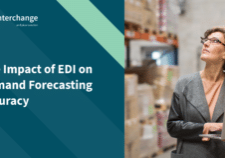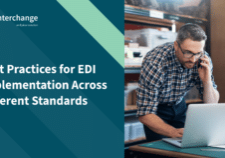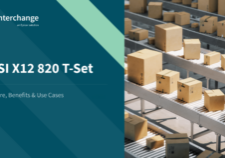How to Choose The Right EDI Provider in 2022
Electronic data interchange (EDI) has been digitising the computer-to-computer exchange of crucial business documents across supply chains since the 1960s, when it was first used to speed up the movement of shipping and transportation documents.
This methodology is especially relevant to increasingly complex global trade, with supply chain visibility, flexibility, and planning just some of the reasons why as many as 85% of companies, including Walmart, Volkswagen, and Amazon, have leant on EDI solutions to thrive despite recent setbacks.
Even in the face of global supply chain complexities, EDI allows for significantly faster processes at less cost. But, as its importance in several industries continues to grow, the ability to feel the true benefits of EDI still relies on an effective implementation with the assistance of the right EDI provider.
Here at Data Interchange, we have decades of EDI experience across multiple industries, our co-founder Phillip Friend was even involved in developing the first automotive EDI protocols in the 1980s. As a result, we’re ideally placed to ensure tailored EDI solutions to fit every need and sector.
However, your quest for the right provider is as unique as the challenges that your supply chains face. That’s why in this article, we’ve used our extensive EDI knowledge to look at several questions you should ask yourself when looking for an EDI provider that meets the specific needs of your business.
Do you need support or can you do it alone?
The integration and management of EDI across global partners can be incredibly complex, meaning that even companies who consider themselves EDI capable need to question the level of support that they’re looking for from a vendor.
Predominantly, provider support levels tend to fall somewhere between two contrasting categories, which are:
- Managed services: Management of EDI systems are offloaded to a vendor who provides continued support in terms of technical maintenance, transaction monitoring, and even trading partner specifications.
- Non-managed services: Providers supply all of the tools necessary to manage EDI, but leave integration, oversight, and day-to-day handling to internal teams.
Companies choosing between the two will need to consider their available resources, in-house expertise, and overall EDI budget. For businesses already handling EDI as a core competency, non-managed services that effectively cut out the middleman do offer some level of internal freedom, as well as the potential for more immediate changes on the ground.
However, as faster onboarding and adaptability benefits largely shape success in a modern EDI landscape, potentially outdated internal handling can become a pitfall that prevents the supply chain benefits EDI stands to offer in the first place. That’s one reason why managed services are quickly growing in popularity. Resolving EDI implementation issues without adding to workloads is especially valuable, as is the professional oversight that ensures the deployment of modern EDI best practices.


Cloud EDI vs On-premises?
When choosing an EDI provider, businesses need to ensure that they identify a partner capable of delivering an EDI solution that meets the specific demands of their operations. This means deciding upon either cloud-based EDI or an on-premise solution and then making your choice of provider accordingly.
Let’s take a look at on-premises EDI and cloud-based solutions in a little more detail:
- On-premises EDI: Often preferred by companies with existing EDI experience or small supply chains, on-premises EDI is deployed on-site through in-house servers. These are complete solutions, and the elimination of costs such as data and provider fees can also be a plus for companies already employing EDI experts in-house.
- Cloud EDI: Accessed via a network connection, cloud-based EDI increases efficiency, boosts visibility and facilitates smooth collaboration. Simply put, cloud-based solutions require less time and resources to build and manage. Two prime examples of cloud-based EDI solutions are EDI via VAN (Value Added Network) and Web EDI.
An ever-changing business landscape has highlighted the need for flexible, rapid solutions that adapt to challenges as they arise. This poses a strong argument for a cloud-based approach to EDI in most instances, which also has the added benefit of being extremely cost-effective.
That said, for companies looking to avoid relying on third parties and the additional costs that can bring, the one-time expenses of entirely self-managed on-premises solutions can still hold a certain appeal. This is especially true where fully-staffed IT teams can address challenges like convoluted, lengthy onboarding with ease.
Understanding how well equipped a provider is to deliver the solution that best suits you is an essential part of deciding the right EDI provider for your business.
What about your supply partners?
While EDI solutions should inevitably meet your specific requirements, it’s also worth remembering that you’re largely considering EDI in the first place to increase appeal as a prospect for trade. Therefore, it’s also fundamental to consider how a provider benefits either existing supply chain partners or future onboarding prospects.
Unfortunately, it can be tricky to predict the needs of companies that you may have had limited dealings with until now, especially if you haven’t got supply chain communication up to scratch. That said, regardless of internal specifics, settling on the ideal EDI provider is possible by considering the differing needs of trading partners in general by asking crucial questions such as:
- Do supply partners need support? Only by considering the EDI expertise and existing integrations of partners is it possible to ensure the responsive solutions necessary for global reach, positive supplier relationship management (SRM), and network-wide visibility. Depending on supplier levels of experience and EDI understanding, providers will either need to offer responsive, real-time support, or backseat processes that fit with operations as they stand.
- How often do you need to onboard/offload? Understanding how often supply relationships end, how likely you are to onboard or offload suppliers in the near future, and how best to make that a smooth experience for everyone, is also imperative. Providers that offer faster onboarding and the accommodation of wide-reaching communication protocols and standards should be a priority for companies who regularly cycle supply relationships, while a focus on longer-lasting trade partners requires the prioritisation of SRM and increased visibility as standard.
Only by accounting for these considerations at an early stage can companies identify EDI solutions that work for all partners, and thereby benefit from the all-important strong, collaborative supplier relationships EDI can offer.
EDI-as-a-Service is your answer
Too often, when considering EDI providers, it can feel like impossible compromises have to be made. In reality, though, the best possible provider should offer a full solution that meets all of your needs without compromise.
At Data Interchange, we’ve developed a modern EDI solution that we call EDI-as-a-Service to make sure that we meet your requirements, rather than asking you to prioritise your needs. Offering the ideal mix of cloud-based expert oversight and tailored self-led solutions, this multifaceted 21st-century approach to EDI offers the most appealing possible answer to all of the provider priorities raised, thus helping you and your supply partners to enjoy a range of benefits that include:
- Simplified onboarding
- Complete accommodation of EDI standards and protocols
- A single-source-of-truth control
- Predictable costs
- Simplified automation
The flexibility and support offered by EDI-as-a-Service are essential in order for businesses to retain a competitive advantage, regardless of how industries continue to shift as we move into 2022. To find out precisely why we could be the ideal provider to accommodate all of your EDI needs throughout the next year and beyond, get in touch to talk to an expert today.



























































































































